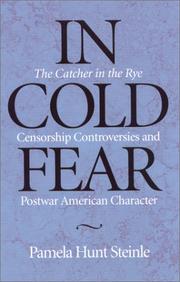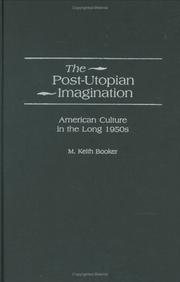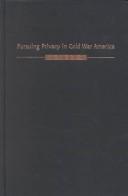| Listing 1 - 3 of 3 |
Sort by
|

ISBN: 081425053X Year: 2002 Publisher: Columbus (OH) : Ohio State University Press,
Abstract | Keywords | Export | Availability | Bookmark
 Loading...
Loading...Choose an application
- Reference Manager
- EndNote
- RefWorks (Direct export to RefWorks)
SALINGER (JEROME DAVID), 1919 --- -CARACTERISTIQUES NATIONALES --- CENSURE --- GUERRE MONDIALE (2E, 1939-1945) DANS LA LITTERATURE --- GUERRE FROIDE DANS LA LITTERATURE --- ADOLESCENTS DANS LA LITTERATURE --- ADOLESCENTS FUGUEURS DANS LA LITTERATURE --- AMERICAINS --- ETATS-UNIS --- SALINGER (JEROME DAVID), 1919 --- -CARACTERISTIQUES NATIONALES --- CENSURE --- GUERRE MONDIALE (2E, 1939-1945) DANS LA LITTERATURE --- GUERRE FROIDE DANS LA LITTERATURE --- ADOLESCENTS DANS LA LITTERATURE --- ADOLESCENTS FUGUEURS DANS LA LITTERATURE --- AMERICAINS --- ETATS-UNIS --- 20E SIECLE

ISBN: 0313321655 Year: 2002 Volume: 13 Publisher: Westport, Conn. London Greenwood Press
Abstract | Keywords | Export | Availability | Bookmark
 Loading...
Loading...Choose an application
- Reference Manager
- EndNote
- RefWorks (Direct export to RefWorks)
Sociology of literature --- Fiction --- American literature --- anno 1900-1999 --- Cold War in literature --- Dys-utopies dans la littérature --- Dystopias in literature --- Dysutopieën in de literatuur --- Guerre froide dans la littérature --- Koude oorlog in de literatuur --- Littérature réaliste --- Neorealism (Literature) --- Neorealisme (Literatuur) --- Néoréalisme (Littérature) --- Realism (Literary movement) --- Realism in literature --- Realisme (Letterkundige beweging) --- Realisme (Literaire beweging) --- Realisme in de literatuur --- Realistische literatuur --- Réalisme (Mouvement littéraire) --- Réalisme dans la littérature --- American fiction --- 20th century --- History and criticism --- Politics and literature --- United States --- History --- Literature and society --- Popular culture --- Political fiction [American ] --- Motion pictures --- Thompson, Jim --- Criticism and interpretation

ISBN: 0231111215 0231111207 0231528698 0231505884 9780231111201 9780231111218 Year: 2002 Volume: *4 Publisher: New York : Columbia University Press,
Abstract | Keywords | Export | Availability | Bookmark
 Loading...
Loading...Choose an application
- Reference Manager
- EndNote
- RefWorks (Direct export to RefWorks)
Pursuing Privacy in Cold War America explores the relationship between confessional poetry and constitutional privacy doctrine, both of which emerged at the end of the 1950s. While the public declarations of the Supreme Court and the private declamations of the lyric poet may seem unrelated, both express the upheavals in American notions of privacy that marked the Cold War era. Nelson situates the poetry and legal decisions as part of a far wider anxiety about privacy that erupted across the social, cultural, and political spectrum during this period. She explores the panic over the "death of privacy" aroused by broad changes in postwar culture: the growth of suburbia, the advent of television, the popularity of psychoanalysis, the arrival of computer databases, and the spectacles of confession associated with McCarthyism.Examining this interchange between poetry and law at its most intense moments of reflection in the 1960s, '70s, and '80s, Deborah Nelson produces a rhetorical analysis of a privacy concept integral to postwar America's self-definition and to bedrock contradictions in Cold War ideology. Nelson argues that the desire to stabilize privacy in a constitutional right and the movement toward confession in postwar American poetry were not simply manifestations of the anxiety about privacy. Supreme Court justices and confessional poets such as Anne Sexton, Robert Lowell, W. D. Snodgrass, and Sylvia Plath were redefining the nature of privacy itself. Close reading of the poetry alongside the Supreme Court's shifting definitions of privacy in landmark decisions reveals a broader and deeper cultural metaphor at work.
Autobiografie in de literatuur --- Autobiographie dans la littérature --- Autobiography in literature --- Belijdenis in de literatuur --- Cold War in literature --- Confession dans la littérature --- Confession in literature --- Guerre froide dans la littérature --- Koude oorlog in de literatuur --- Privacy in de literatuur --- Privacy in literature --- Self in literature --- Soi dans la littérature --- Vie privée dans la littérature --- Zelf in de literatuur --- Amerikaans. --- Cold War (1945-1989) in literature. --- Cold War in literature. --- Confession in literature. --- Lyrik. --- Ost-West-Konflikt. --- Privacy in literature. --- Privacy, Right of. --- Privacy. --- Privatsphäre. --- Schutz. --- Self in literature. --- Poetry --- Sociology of literature --- American literature --- anno 1900-1999 --- American poetry --- American poetry. --- Autobiography in literature. --- Letterkunde. --- Literature and society --- Literature and society. --- Privacy --- Privacy, Right of --- History and criticism --- History --- 1900-1999. --- USA. --- United States. --- 20th century --- United States --- Privacy [Right of ] --- Privacy - United States - History - 20th century. --- History and criticism. --- Social psychology --- Secrecy --- Solitude --- Invasion of privacy --- Right of privacy --- Civil rights --- Libel and slander --- Personality (Law) --- Press law --- Computer crimes --- Confidential communications --- Data protection --- Right to be forgotten --- Law and legislation
| Listing 1 - 3 of 3 |
Sort by
|

 Search
Search Feedback
Feedback About
About Help
Help News
News